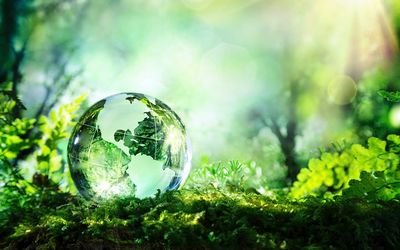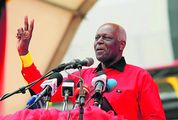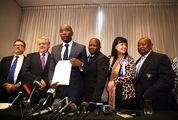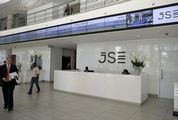Why eat grass when Earth wants to give us more?
by Johan van den Berg
2016-08-12 05:58:27.0
THE debate about Eskom and independent power ultimately revolves around two main starting points where the disputants are at odds. The one paradigm is the centralisation of political and economic power as opposed to the democratisation thereof. The other is the opposition between traditional thinking trusting in rigid and manipulable power sources and the modern move towards a flexible and diverse energy system. The latter debate has already been settled for more than a decade in more progressive countries such as Germany, but the fact it is still finding some traction in SA invites elucidation with reference to the world of food.
Imagine a discussion a few millennia ago about how we should ensure we always have enough to eat. Most vocal is a somewhat unimaginative technocrat with a high level of anxiety and a predilection for standardised solutions implemented top-down. Let’s call him Joe.
The rest of us villagers or tribe members are more courageous, more trusting in diversity and bottom-up solutions, more democratic with an appreciation for the cultural and spiritual dimensions of everything we do. "We’re no longer nomadic," says Joe, "we live in one place now, we can’t follow the food like our ancestors did. We have to make sure we always have enough to eat!"
And so the discussion starts about what is really dependable. There is wheat, corn and other things we plant. "What if it doesn’t rain?", asks Joe. "Or what if it burns?" We point out we have livestock from which we get meat and milk. "What if there is a drought or an animal illness?" Joe counters, rolling his eyes to impress upon us the gravity of the matter.
We go on, mentioning the fish in the sea, but Joe uses the sardine run as an example of why we shouldn’t count on fish. Thousands of fish today, nothing in a week. The fruit on the trees and the nuts in the ground don’t satisfy him either, and he quickly thinks up a doomsday scenario where it disappears from our grasp. No, Joe insists, we should eat grass. It is always available, summer or winter, and this is what we should eat. Grass, just grass and nothing but grass. Dependable and predictable — even in a drought, it will grow somewhere (or so he says).
We think about how tasteless that is, how lacking in culture and spirituality, how constipated we are likely to feel as we try to rid ourselves of a waste stream our bodies were not made for. And so the tribe or the village chooses a different direction, the one of trust and diversity, modernity and innovation. We plant seeds and work on ways to store the food, so we learn to make flour and maize meal. We learn how to preserve milk by making condensed milk and milk powder.
We learn how to preserve fruit in jam and how to cure meat. We learn how to can food. We start baking — French loaves and rye, doughnuts and croissants and a thousand other things — and we enjoy some of these with the preserves and cured meat.
We improve our transport routes so we can move food from areas of abundance to areas of need. In time we are privileged to enjoy delicious cuisine from far away regions, and have restaurants from just about every country in the world. And Joe’s idea and his fears are long forgotten. We build societies and social events around food; it acquires a cultural and spiritual dimension.
This, in essence, is the discussion happening around SA’s electricity mix. The voice claiming that nuclear is the only low-carbon option we can depend on is the voice of Joe, insisting on total predictability and stating that nuclear power may be expensive but can be depended upon to arrive at 6pm on a Wednesday evening. For this reason he thinks it is the only choice. No hat is tipped to wind or solar or hydro or geothermal or wave energy, just like fish and livestock and planted seeds and fruit and nuts were once discarded for not always being equally available. In Joe’s world, only grass can prevent starvation.
And yet the opposite is true. The progressive countries and electricity systems have realised that we can build a dependable solution out of a number of variable components. The wind always blows somewhere, the sun always shines somewhere, and it is through the diversity that we acquire strength and predictability. As we learnt how to make wheat and cured meat to store food for another day, so we have learnt how to store electricity for another day. As we built transport routes to move food from areas of abundance to areas of need, so we have built electrical interconnectors to move electricity — and we can do much more. Countries such as Germany and Denmark are well on their way to a fully renewable energy future where it is flexibility that is rewarded rather than rigidity and predictability.
READ THIS: Nurturing factions will aggravate the ANC’s disease
In SA, our large landmass combined with abundance of wind and solar resources have been shown by research to allow a more ambitious progress on this journey — the combination of it is very predictable and reliable at a certain percentage of full output level. Moreover, we have a historical and massive oversupply of predictable and manipulable power sources, the youngest of which will still be around for perhaps 50 years. We can build all the renewables we want, as fast as we can, and not think about grid stability for a decade at least, by which time the electricity storage revolution will be mature. Already we have much pumped storage capacity we can use.
As we progress on this journey to sustainability, we will democratise energy and live on the free and inexhaustible resources of nature that occur with the weather and the seasons, and remember something of our nomadic past. Energy will acquire a cultural and spiritual dimension, as food did, and the choice we made to believe in diversity and innovation will seem more logical every day.
• Van den Berg is the author of "Nero’s Violin — the art of conviction in a divided world". He works in the energy sector and writes in his personal capacity

As we progress on this journey to sustainability, we will democratise energy and live on the free and inexhaustible resources of nature, says the writer. Picture: ISTOCK
THE debate about Eskom and independent power ultimately revolves around two main starting points where the disputants are at odds. The one paradigm is the centralisation of political and economic power as opposed to the democratisation thereof. The other is the opposition between traditional thinking trusting in rigid and manipulable power sources and the modern move towards a flexible and diverse energy system. The latter debate has already been settled for more than a decade in more progressive countries such as Germany, but the fact it is still finding some traction in SA invites elucidation with reference to the world of food.
Imagine a discussion a few millennia ago about how we should ensure we always have enough to eat. Most vocal is a somewhat unimaginative technocrat with a high level of anxiety and a predilection for standardised solutions implemented top-down. Let’s call him Joe.
The rest of us villagers or tribe members are more courageous, more trusting in diversity and bottom-up solutions, more democratic with an appreciation for the cultural and spiritual dimensions of everything we do. "We’re no longer nomadic," says Joe, "we live in one place now, we can’t follow the food like our ancestors did. We have to make sure we always have enough to eat!"
And so the discussion starts about what is really dependable. There is wheat, corn and other things we plant. "What if it doesn’t rain?", asks Joe. "Or what if it burns?" We point out we have livestock from which we get meat and milk. "What if there is a drought or an animal illness?" Joe counters, rolling his eyes to impress upon us the gravity of the matter.
We go on, mentioning the fish in the sea, but Joe uses the sardine run as an example of why we shouldn’t count on fish. Thousands of fish today, nothing in a week. The fruit on the trees and the nuts in the ground don’t satisfy him either, and he quickly thinks up a doomsday scenario where it disappears from our grasp. No, Joe insists, we should eat grass. It is always available, summer or winter, and this is what we should eat. Grass, just grass and nothing but grass. Dependable and predictable — even in a drought, it will grow somewhere (or so he says).
We think about how tasteless that is, how lacking in culture and spirituality, how constipated we are likely to feel as we try to rid ourselves of a waste stream our bodies were not made for. And so the tribe or the village chooses a different direction, the one of trust and diversity, modernity and innovation. We plant seeds and work on ways to store the food, so we learn to make flour and maize meal. We learn how to preserve milk by making condensed milk and milk powder.
We learn how to preserve fruit in jam and how to cure meat. We learn how to can food. We start baking — French loaves and rye, doughnuts and croissants and a thousand other things — and we enjoy some of these with the preserves and cured meat.
We improve our transport routes so we can move food from areas of abundance to areas of need. In time we are privileged to enjoy delicious cuisine from far away regions, and have restaurants from just about every country in the world. And Joe’s idea and his fears are long forgotten. We build societies and social events around food; it acquires a cultural and spiritual dimension.
This, in essence, is the discussion happening around SA’s electricity mix. The voice claiming that nuclear is the only low-carbon option we can depend on is the voice of Joe, insisting on total predictability and stating that nuclear power may be expensive but can be depended upon to arrive at 6pm on a Wednesday evening. For this reason he thinks it is the only choice. No hat is tipped to wind or solar or hydro or geothermal or wave energy, just like fish and livestock and planted seeds and fruit and nuts were once discarded for not always being equally available. In Joe’s world, only grass can prevent starvation.
And yet the opposite is true. The progressive countries and electricity systems have realised that we can build a dependable solution out of a number of variable components. The wind always blows somewhere, the sun always shines somewhere, and it is through the diversity that we acquire strength and predictability. As we learnt how to make wheat and cured meat to store food for another day, so we have learnt how to store electricity for another day. As we built transport routes to move food from areas of abundance to areas of need, so we have built electrical interconnectors to move electricity — and we can do much more. Countries such as Germany and Denmark are well on their way to a fully renewable energy future where it is flexibility that is rewarded rather than rigidity and predictability.
READ THIS: Nurturing factions will aggravate the ANC’s disease
In SA, our large landmass combined with abundance of wind and solar resources have been shown by research to allow a more ambitious progress on this journey — the combination of it is very predictable and reliable at a certain percentage of full output level. Moreover, we have a historical and massive oversupply of predictable and manipulable power sources, the youngest of which will still be around for perhaps 50 years. We can build all the renewables we want, as fast as we can, and not think about grid stability for a decade at least, by which time the electricity storage revolution will be mature. Already we have much pumped storage capacity we can use.
As we progress on this journey to sustainability, we will democratise energy and live on the free and inexhaustible resources of nature that occur with the weather and the seasons, and remember something of our nomadic past. Energy will acquire a cultural and spiritual dimension, as food did, and the choice we made to believe in diversity and innovation will seem more logical every day.
• Van den Berg is the author of "Nero’s Violin — the art of conviction in a divided world". He works in the energy sector and writes in his personal capacity



















